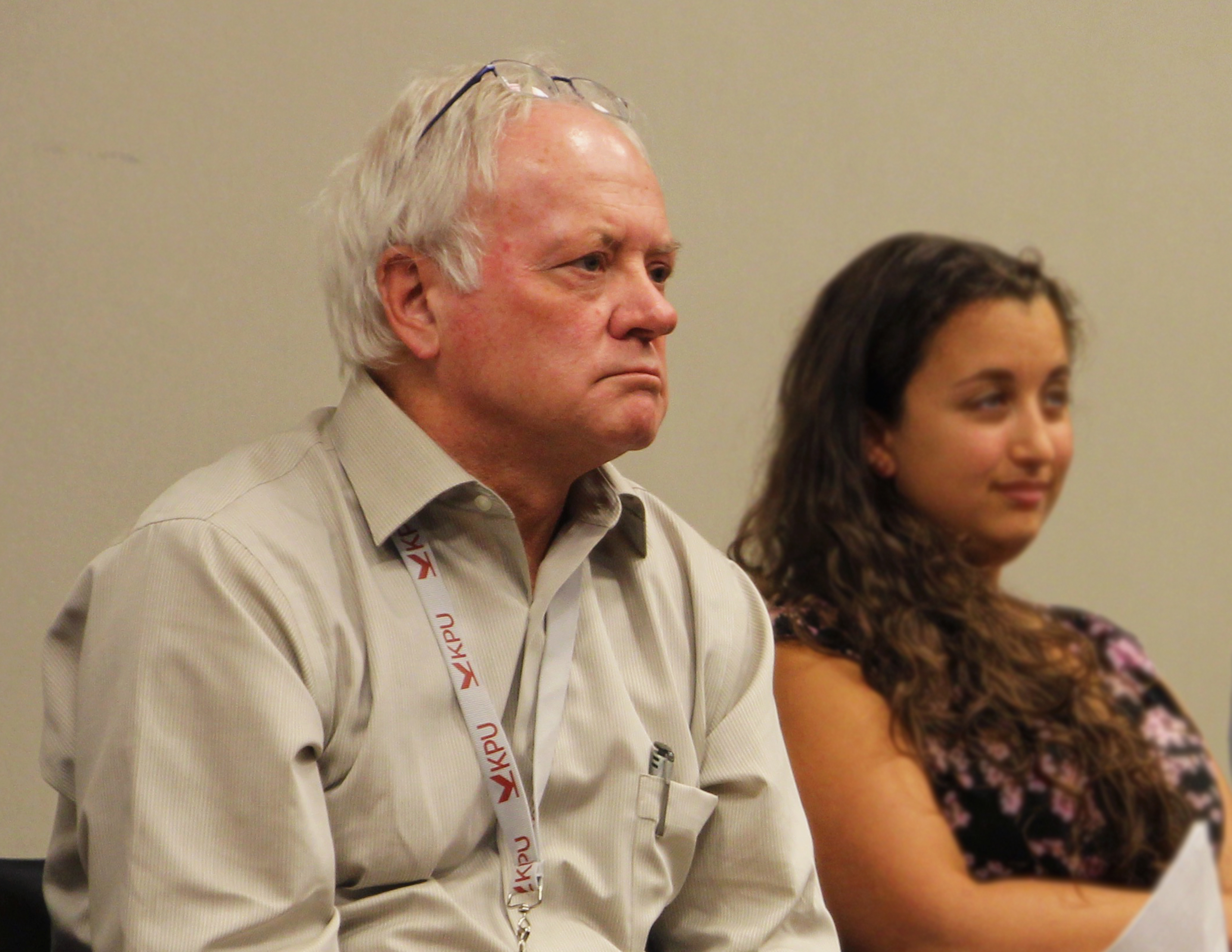Please support our coverage of democratic movements and become a supporter of rabble.ca.
A public forum with Kwantlen Polytechnic University was held earlier this week on Kwantlen’s Surrey campus, July 6, to discuss Kwantlen’s agreement with Kinder Morgan. Kwantlen signed a memorandum of understanding with Kinder Morgan on June 23. Kinder Morgan will donate $300,000 to Kwantlen over a course of 20 years — if the Trans Mountain Expansion Project is approved.
Students have vowed to refuse scholarships funded by Kinder Morgan. And faculty, community members, and Kwantlen First Nations have denounced Kwantlen’s move. Many are calling the agreement immoral and unethical.
President and Vice-Chancellor of Kwantlen Polytechnic University, Alan Davis, was present at the forum to attend to the questions and concerns of students, faculty, and concerned citizens.
The conference room on Kwantlen’s Surrey campus where the forum was held was packed. Some audience members were left standing while others stood just outside the crowded conference room.
The number of people opposed to the MOU outweighed the number of people in favor of Kwantlen’s partnership with Kinder Morgan. Out of the many students, faculty, and community members who spoke out against the agreement, only one person stood up to speak in favour.
But despite the overwhelming opposition against the MOU between Kwantlen and Kinder Morgan, Kwantlen President Alan Davis refused to rescind the agreement or acknowledge Kinder Morgan’s contribution to climate change.
“I’m not here to discuss whether or not the pipeline is a good thing or bad thing. Or what kind of impact it may or may not have,” said Davis.
“If we start with voices of good guy or bad guy — who we do or don’t take money from — we enter tricky waters. If you follow money, if you follow where money comes from, if you follow how people make their money — you can shut the door on anybody.”
“The MOU was undertaken in good favor for the right reasons.”
The panelists at the conference included Justin Bige speaking on behalf of Kwantlen First Nations, Kwantlen Student Association President Allison Gonzalez, Richard Hosein of Kwantlen Public Interest Research Group, and Chapter Coordinator Justine Nelson of the PIPE UP Network. All spoke out against the MOU.
Nelson asserted that the social and environmental costs of tanker spills undermine any royalties or gifts from Kinder Morgan.
“A tanker spill could cost nine billion dollars to clean up and would cause irreparable damage to coastal ecosystems. When a spill happens, it will affect our drinking water, our farms, our homes, our schools, our health, and our economy,” said Nelson.
“How well does the tourism economy do when our beaches are covered in oil and air is full of poisonous gas? How well does the fishing economy do when the river or ocean is full of oil? If approved, this expansion will have increased risks and provide no net benefit for British Columbia.”
Kwantlen student, Eric Wirsching, also directed a question to Davis.
“Does my university acknowledge this agreement will be perceived by the public as a form of endorsement, that Kinder Morgan will attempt to use it as such, and that it will and already has affected KPU’s public reputation to the detriment of its graduates?” asked Wirsching.
In response, Davis stated, “With respect, Eric, I disagree — and I don’t think there’s any evidence to suggest what you are suggesting.”
Throughout the public forum, Davis reiterated that the MOU was signed for the benefit of Kwantlen’s students.
But Davis’ justification did not convince Bill Burgess, among others at the public forum.
Bill Burgess, a geography professor at Kwantlen pointed out an alternative motive of the MOU.
“One of the points of the memorandum is that the awards will go to students who live within 80 kilometers of the pipeline,” Burgess noted.
“Is that not a calculated effort to divert attention from the larger political and social issues — global climate change and others — And to instead focus people’s attention on tiny benefits to a few members of the local community?”
“Why would we involve ourselves in such a transparent public relationship?” asked Burgess.
But Davis’ response remained unwavering. Restating what he repeated throughout the public forum, Davis maintained the MOU was signed in the interest of students.
“As the president of KPU, it’s my job to try and get resources that students need to get their education. That’s all that the MOU is about,” Davis repeated.
Lenée Son is a freelance multimedia journalist living in Metro Vancouver and the rabble.ca Blogs intern.
Image: Lenée Son
Please support our coverage of democratic movements and become a supporter of rabble.ca.



